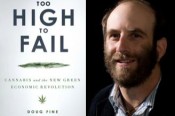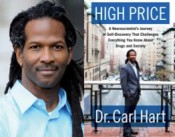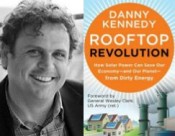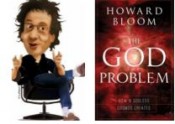Free Forum Q&A – MARCIA COYLE, Author of THE ROBERTS COURT: Struggle for the Constitution
Written on July 9th, 2013 |
Aired: 07/07/13
A friend tells the story of striking up a conversation with a hip looking man in his late 20s-early 30s in a movie line on the west side of LA shortly before the 2004 election between George Bush and John Kerry. He asked the young man who he planned to vote for, he answered that he hadn’t made up his mind. My friend said to him, “Two words. Supreme Court.” To which the young man replied, “Oh, are we voting for them too?”
While we may be disappointed in his apparent lack of civics knowledge, in his own way, he spoke the truth. The most lasting actions a president takes may be his appointments to the Supreme Court. Supreme Court justices serve for as long as they wish or as long as they are able. Their decisions very often set precedents that can live forever. Bush had appointed John Roberts Chief Justice in his first term, but according to today’s guest, it was his second term appointment of Samuel Alito to replace Sandra Day O’Connor that really solidified the Roberts Court.
O’Connor had been a much more moderate conservative than Alito has proven to be. The center of the court shifted to the right, which may matter little in decisions with large majorities – more than 50% of cases each term are decided unanimously or by 8-1 or 7-2 votes — but can be crucial in decisions decide 5-4.
MARCIA COYLE has chosen to focus her book THE ROBERTS COURT: The Struggle for the Constitution on four such 5-4 decisions – Citizens United on campaign finance; District of Columbia v Heller on gun control; on race in school choice; and on the constitutionality of the Affordable Care Act.
Q&A w/ DOUG FINE, Author of TOO HIGH TO FAIL: Cannabis and the New Green Economic Revolution
Written on June 25th, 2013 |
Aired: 06/23/13
This week, in the second of a two-part series (Part One with CARL HART, author of HIGH PRICE: A Neuroscientist’s Journey of Self-Discovery that Challenges Everything You Know about Drugs and Society) I’m joined by DOUG FINE to talk about the accelerating movement to change the rules on marijuana. According to Fine, as the economy continues to limp along for most Americans and California cities declare bankruptcy, one action — the legalization of marijuana — would save government billions per year while raising huge sums in taxes. According to TIME, the legal medicinal cannabis economy already generates $200 million annually in taxable proceeds from a mere five hundred thousand registered medical users in just sixteen states. 51% of Americans support full legalization (cannabis regulated for adults like alcohol), and 80% support medicinal cannabis legalization.
Fine’s book, TOO HIGH TO FAIL: Cannabis and the New Green Economic Revolution, is just out in paperback. In a postscript added to the new edition, Fine writes,” On November 6, 2012, Colorado and Washington voters ended the Drug War. That is to say, voters in both states overwhelmingly legalized adult social use of cannabis (Colorado’s new law, vitally, also allows industrial cannabis cultivation). It is no stretch to say that the Berlin Wall of the Drug War fell.” We’ll talk about how quickly the landscape is changing and look ahead to the era of legal marijuana.
Q&A w/ author, Carl Hart – HIGH PRICE: A Neuroscientist’s Journey of Self-Discovery that Challenges Everything You Know about Drugs and Society
Written on June 18th, 2013 |
Aired: 06/16/13
This week’s guest, neuroscientist CARL HART grew up in one of Miami’s toughest neighborhoods and, in his first book, HIGH PRICE, he explores how it is that he avoided becoming one of the crack addicts he now studies.
Columbia University’s first tenured African American professor in the sciences, Hart goes beyond disputing myths, falsehoods, and ignorance about drugs, drug users, and drug policy. He has been engaged in cutting edge research since the late 90s, testing individuals with actual drugs. His controversial work is redefining our understanding of addiction. He examines the relationships between drugs, pleasure, choice, and motivation, both in the brain and in society. Hart’s findings shed new light on issues of race, poverty, and drugs, and help explain perhaps more clearly than ever why current policies are doomed to fail.
www.highpricethebook.com
Q&A w/ DANNY KENNEDY, ROOFTOP REVOLUTION: How Solar Power Can Save Our Economy and the Planet from Dirty Energy
Written on May 13th, 2013 |
Aired: 05/12/13
Is there a revolution coming to your rooftop? While opponents claim solar is expensive, inefficient, and unreliable, in his book ROOFTOP REVOLUTION: How Solar Power Can Save Our Economy And Our Planet From Dirty Energy, DANNY KENNEDY makes clear solar can save money, create jobs, and protect the environment if only politics and perception will get out of the way.
During the recent Presidential campaign, we heard a lot about Solyndra, the solar start-up that received a sizable government loan only to go belly up. Solar’s detractors claim the collapse of Solyndra proves solar is just a hippie pipe dream, but Danny Kennedy, says the truth is quite the opposite. Solyndra failed because it wasn’t able to compete in a red-hot industry, not because solar isn’t ready for prime time.
The industry employs 100,000 people in the United States, twice as many as in 2009 and twice the number of coal miners. In 2011, Warren Buffett invested $2 billion in a solar farm, and General Electric bought a start-up solar manufacturer, announcing, “By 2020 this is going to be at least a $1 billion product line.” Production of solar-generated electricity rose by 45% in the first three quarters of 2010, while electricity from natural gas rose only 1.6% and coal declined by 4.2%. Kennedy argues for a rooftop revolution to break the entrenched power of the coal, oil, nuclear, and natural gas industries and their progress-denying allies.
www.rooftoprevolutionbook.com
www.sungevity.com
Q&A: Howard Bloom, Author – THE GOD PROBLEM: How a Godless Cosmos Creates
Written on January 22nd, 2013 |
Aired: 01/20/13
HOWARD BLOOM has been called “next in a lineage of seminal thinkers that includes Newton, Darwin, Einstein,[and] Freud,” by Britain’s Channel4 TV , and “the next Stephen Hawking” by Gear Magazine. His books include The Lucifer Principle: A Scientific Expedition Into the Forces of History; Global Brain: The Evolution of Mass Mind from the Big Bang to the 21st Century; The Genius of the Beast: A Radical Re-Vision of Capitalism; and his latest, THE GOD PROBLEM: How a Godless Cosmos Creates.
Heavy stuff, sure, but his biography is a lot quirkier than that list might suggest. From 1968 to 1988, Bloom made his mark in the music business, founding and running its biggest PR firm, working with Michael Jackson, Prince, Bob Marley, Bette Midler, Queen, Simon & Garfunkel, Peter Gabriel, Grandmaster Flash and the Furious Five, among many others. He helped launch Farm Aid and Amnesty International’s American presence, and put together the first public service radio campaign for solar power.
Bloom launched a successful kickstarter campaign to raise money for PR for THE GOD PROBLEM because changing a paradigm doesn’t just happen. A lot of people have given glowing blurbs to this book, but let me quote one by Barbara Ehrenreich, author of Nickel and Dimed, “If Howard Bloom is only 10 percent right, we’ll have to drastically revise our notions of the universe. There’s no mysticism in The God Problem—no God, no religion, no incommunicable spiritual insights – just the contagious joy of a great mind set loose on the biggest intellectual puzzles humans have ever faced. Whether you’re a scientist or a hyper-curious layperson, Bloom’s argument will rock your world.”
www.howardbloom.net
